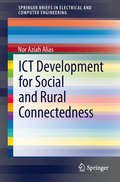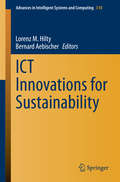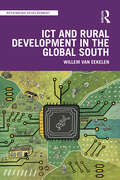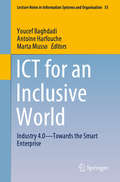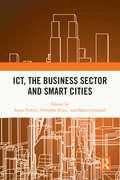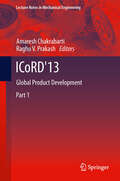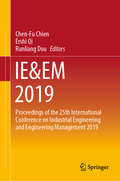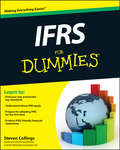- Table View
- List View
ICT Development for Social and Rural Connectedness
by Nor Aziah AliasICT Development for Social and Rural Connectedness provides an introduction to the concept of 'connectedness', and explores how this socio-psychological term has evolved during the age of the Internet. The book surveys the principles of ICT for development (ICTD), and closely examines how ICT has played a pivotal role in the rural community development of various countries. To highlight the continued benefits of ICT in these regions, the book presents an in-depth case study that analyzes the connectedness within the rural internet centers of Malaysia. The book is intended primarily for researchers and practitioners as a reference guide to ICTD in rural environments.
ICT Equipment Investment and Growth in Low- and Lower-Middle-Income Countries
by Markus HaackerA report from the International Monetary Fund.
ICT Innovations for Sustainability
by Lorenz M. Hilty Bernard AebischerICT Innovations for Sustainability is an investigation of how information and communication technology can contribute to sustainable development. It presents clear definitions of sustainability, suggesting conceptual frameworks for the positive and negative effects of ICT on sustainable development. It reviews methods of assessing the direct and indirect impact of ICT systems on energy and materials demand, and examines the results of such assessments. In addition, it investigates ICT-based approaches to supporting sustainable patterns of production and consumption, analyzing them at various levels of abstraction - from end-user devices, Internet infrastructure, user behavior, and social practices to macro-economic indicators. Combining approaches from Computer Science, Information Systems, Human-Computer Interaction, Economics, and Environmental Sciences, the book presents a new, holistic perspective on ICT for Sustainability (ICT4S). It is an indispensable resource for anyone working in the area of ICT for Energy Efficiency, Life Cycle Assessment of ICT, Green IT, Green Information Systems, Environmental Informatics, Energy Informatics, Sustainable HCI, or Computational Sustainability.
ICT Investment for Energy Use in the Industrial Sectors
by Nabaz T. KhayyatThis book investigates the impact of production input factors on the market, consumer and producer energy demand characteristics in 30 industrial sectors for South Korea over the period 1980-2009, and for Japan over the period 1973-2006, with special emphasis placed on the effects of ICT investment on the demand for energy. A dynamic factor demand model is developed, accounting for the adjustment costs that are defined in terms of forgone output from current production. It addresses four key aspects of production and energy demand in manufacturing: first, it establishes the various relationships between different factors of production. Second, it investigates whether the energy demand in the industrial sectors in South Korea would be decreased or increased by substituting/complementing with other input factors such as ICT capital and labor. Third, it looks at sources of growth in the industrial sectors through decomposing the Divisia index based total factor productivity (TFP). Finally it provides appropriate policy recommendations based on these findings. The results of this study may provide industrial sectors' stakeholders and environmental and industrial policy makers with a flexible model that has the capacity to assess outcomes of various policies under certain scenarios. The factor demand methodology described in this book is very advanced and up-to-date. It can be used when teaching advanced graduate courses and in empirically advanced research. Therefore, it is highly relevant in both teaching as a main or supplementary text and in particular as a reference handbook in conducting empirical research. The focus on ICT effects on energy use makes this book an important addition to the existing literature on industrial development.
ICT and Rural Development in the Global South (Rethinking Development)
by Willem van EekelenThis book dives into the achievements, opportunities, risks and dangers of ICT in the rural Global South, and takes a look at the likely future. Drawing on years of experience across 45 counties, as well as extensive original academic research, Willem van Eekelen situates the evolving role of ICT in wider development patterns in the Global South. He discusses the effects of ICT on agriculture, trade, financial flows, resource management and governmental performance. He then considers the associated risks of financial insecurity, online gambling, exclusion, misinformation and the effects of ICT on people’s freedom. The book concludes with six recommendations to maximise the usefulness of rural ICT investments and minimise the risk of them causing harm. This engaging and authoritative account of ICT and rural development will help students, academics, governmental policymakers, donors and investors wishing to support socio-economic development in the Global South.
ICT for an Inclusive World: Industry 4.0–Towards the Smart Enterprise (Lecture Notes in Information Systems and Organisation #35)
by Youcef Baghdadi Antoine Harfouche Marta MussoThis book discusses the impact of information and communication technologies (ICTs) on organizations and on society as a whole. Specifically, it examines how such technologies improve our life and work, making them more inclusive through smart enterprises. The book focuses on how actors understand Industry 4.0 as well as the potential of ICTs to support organizational and societal activities, and how they adopt and adapt these technologies to achieve their goals. Gathering papers from various areas of organizational strategy, such as new business models, competitive strategies and knowledge management, the book covers a number of topics, including how innovative technologies improve the life of the individuals, organizations, and societies; how social media can drive fundamental business changes, as their innovative nature allows for interactive communication between customers and businesses; and how developing countries can use these technologies in an innovative way. It also explores the impact of organizations on society through sustainable development and social responsibility, and how ICTs use social media networks in the process of value co-creation, addressing these issues from both private and public sector perspectives and on national and international levels, mainly in the context of technology innovations.
ICT, Pedagogy and the Curriculum: Subject to Change
by Viv Ellis Avril LovelessThis book explores the impact new information and communication technologies are having on teaching and the way children learn. The book addresses key issues across all phases of primary and secondary education, both in the UK and internationally. ICT, Pedagogy and the Curriculum looks at the relationship between ICT, paradigms of teaching and learning, and the way in which curriculum subjects are represented. Three principal areas are addressed: * the wider perception of ICT in society, culture and schooling* the challenges to pedagogy* the way in which ICT not only supports learning and teaching but changes the nature of curriculum subjects. The tensions between the use of technology to replicate traditional practices, and the possibilities for transforming the curriculum and pedagogy are explored, offering an original and distinctively critical perspective on the way in which we understand ICT in education. It will be of interest to all primary and secondary teachers and those in initial teacher training who are concerned about current technology initiatives in education and how to respond to them.
ICT, the Business Sector and Smart Cities
by Anna Visvizi Orlando Troisi Mara GrimaldiThis book examines smart cities through the lens of the information and communication technology (ICT)-driven transformation of the economy and economic systems and the resulting changes influencing organizations (public, private, and voluntary) and citizens in the smart city. In this context, the chapters included in this book address very specific questions pertaining to modes and models of economic collaboration, interest aggregation, and determinants of sustainable growth and development in the smart city. To this end, the circular economy, the sharing economy, the platform economy, and open innovation in the smart city are discussed. The notions of economic performance, competition, and business model innovation (BMI) are elaborated in detail. Finally, the question of the fragility of labor markets, including the availability of talent, is explored. By applying conceptually sound, inter- and multi-disciplinary approaches, frequently including case studies, this book provides a thorough insight into the complex question of how tools specific to the fields of economics, business management, innovation management, strategic management, entrepreneurship, and human resource management can be useful in view of understanding and harnessing the intrusion of ICT in the city space.
ICoRD'13: Global Product Development
by Amaresh Chakrabarti Raghu V. PrakashThis book showcases over 100 cutting-edge research papers from the 4th International Conference on Research into Design (ICoRD'13) - the largest in India in this area - written by eminent researchers from over 20 countries, on the design process, methods and tools, for supporting global product development (GPD). The special features of the book are the variety of insights into the GPD process, and the host of methods and tools at the cutting edge of all major areas of design research for its support. The main benefit of this book for researchers in engineering design and GPD are access to the latest quality research in this area; for practitioners and educators, it is exposure to an empirically validated suite of methods and tools that can be taught and practiced.
IDEAS—A Secret Weapon for Business: Think and Collaborate Like a Designer
by Andrew PressmanWe all need creative ideas for solving challenging problems, innovating, and reconciling dilemmas. IDEAS sets forth what every executive should know about contributing to collaborative environments, thinking like a designer, and leading teams.This book suggests a distinctive framework for collaboration informed by design thinking. Collaboration under the umbrella of such a process can be optimally effective in triggering inspiration, leading to fresh ideas that are highly responsive to stakeholders. Collaborative design thinking cannot be reduced to an algorithm; unlike math and science problems there is no single, right answer. Nor are there formulaic or simplistic approaches, which may limit creative possibilities to solving problems or conceiving the right questions. This book will therefore: Render accessible the solution-oriented abilities that we all possess by providing practical tools for thinking imaginatively and critically Demonstrate that elements of design thinking can be cherry-picked, weighted, and combined—depending on the project and its context—to yield a unique process for each problem Focus on the collaborative approach necessary to elicit the best ideas from all stakeholders Rich with case studies and practical insights, this concise, ideas-oriented guide will unlock a new route to innovation for executives, managers, administrators, board members, and especially, aspiring leaders in many types of businesses.
IDEO Product Development
by Stefan ThomkeDescribes IDEO, the world's leading product design firm, and its innovation culture and process. Emphasis is placed on the important role of prototyping and experimentation in general, and in the design of the very successful Palm V handheld computer in particular. A studio leader is asked by a business start-up (Handspring) to develop a novel hand-held computer (Visor) in less than half the time it took to develop the Palm V, requiring several shortcuts to IDEO's legendary innovation process. Focuses on: 1) prototyping and experimentation practices at a leading product developer; 2) the role of playfulness, discipline, and structure in innovation processes; and 3) the managerial challenges of creating and managing an unusually creative and innovative company culture. Includes color exhibits.
IDEO: Human-Centered Service Design
by Ryan W. Buell Andrew OtazoThe case describes IDEO, one of the world's leading design firms, and its human-centered innovation culture and processes. It is an example of what managers can do to make their own organizations more innovative. In reaction to a rapidly changing competitive landscape, a team of IDEO designers have been hired by Cineplanet, the leading movie cinema chain in Peru, to reinvent the movie-going experience for Peruvians. Cineplanet wishes to better align their operating model with the needs and behaviors of its customers.
IDEO: Human-Centered Service Design
by Ryan W. Buell Andrew OtazoThe case describes IDEO, one of the world's leading design firms, and its human-centered innovation culture and processes. It is an example of what managers can do to make their own organizations more innovative. In reaction to a rapidly changing competitive landscape, a team of IDEO designers have been hired by Cineplanet, the leading movie cinema chain in Peru, to reinvent the movie-going experience for Peruvians. Cineplanet wishes to better align their operating model with the needs and behaviors of its customers.
IDFC India: Infrastructure Investment Intermediaries
by John D. Macomber Viraal BalsariIndian financial intermediary matching international capital to local infrastructure decides how to balance range of services, risk-adjusted return, margin pressure, and nation building. IDFC was chartered with partial ownership from the Indian government to help evaluate policy and be a model for how private finance could be attracted to public infrastructure. As the nation and company grow, the firm also grows and embarks on a strategy of rapid expansion, offering a wide new range of financial products and participating in many aspects of the supply chain. Teaching questions include revisiting the original mission, contemplating the reduced margins and increased risks that come with entering a number of domains that already have established incumbents, and the trade-offs between maximizing shareholder return (for example through investments in full tariff power projects in rich cities) and maximizing the benefit to the nation (for example through subsidized tariff water projects in poor states).
IDS Financial Services (Condensed)
by John DeightonHighlights the decision that must be made on balancing customer acquisition and retention and de-emphasizing the structural issues involved in administering the independent contractor sales force.
IDinsight: Informing Decisions for Global Development
by William R. Kerr Dina D. PomeranzHarvard Case Study
IE&EM 2019: Proceedings of the 25th International Conference on Industrial Engineering and Engineering Management 2019
by Chen-Fu Chien Ershi Qi Runliang DouThis book records the new research findings and development in the field of industrial engineering and engineering management, and it will serve as the guidebook for the potential development in future. It gathers the accepted papers from the 25th International conference on Industrial Engineering and Engineering Management held at Anhui University of Technology in Maanshan during August 24-25, 2019. The aim of this conference was to provide a high-level international forum for experts, scholars and entrepreneurs at home and abroad to present the recent advances, new techniques and application, to promote discussion and interaction among academics, researchers and professionals to promote the developments and applications of the related theories and technologies in universities and enterprises, and to establish business or research relations to find global partners for future collaboration in the field of Industrial Engineering. It addresses diverse themes in smart manufacturing, artificial intelligence, ergonomics, simulation and modeling, quality and reliability, logistics engineering, data mining and other related fields. This timely book summarizes and promotes the latest achievements in the field of industrial engineering and related fields over the past year, proposing prospects and vision for the further development.
IEIS 2020: Proceedings of the 7th International Conference on Industrial Economics Systems and Industrial Security Engineering
by Menggang Li Guowei Hua Xiaopu Shang Gábor Bohács Daqing GongThis book contains selected papers of the International Conference on Industrial Economics Systems and Industrial Security Engineering (IEIS 2020), which is co-organized by Beijing Jiaotong University, Budapest University of Technology and Economics, in July 25–28 2020. This book aims to provide new research methods, theories and applications from various areas of industrial economics and engineering. In detail the included scientific papers analyze and describe communication processes in the fields of industrial economics, industrial system, industrial security and engineering and other related areas. The variety of papers delivers added value for both scholars and practitioners.
IEIS 2021: Proceedings of 8th International Conference on Industrial Economics System and Industrial Security Engineering (Lecture Notes in Operations Research)
by Menggang Li Dan Chang Xiaopu Shang Gábor Bohács Anqiang HuangThis book aims to provide new research methods, theories and applications from various areas of industrial economics and engineering. In detail, the included scientific papers analyse and describe communication processes in the fields of industrial economics, industrial system, industrial security and engineering and other related areas. The variety of the papers delivers added value for both scholars and practitioners. This book is the documentation of the IEIS 2021 conference. The book covers a great deal of research achievements in industrial restructuring strategy, industrial organization, industrial policy, departmental economic research, industrial competitiveness, regional industrial structure, national industrial economic security theory and empirical research, and it emphasizes on combining theory with practice. The book aims to discuss the issues in industrial economics and industrial security theories and practices. It is the documentation of IEIS 2021 conference, which took place at Shandong University. Due to the impact of COVID-19, it took place online as a virtual conference.
IEIS 2022: Proceedings of 9th International Conference on Industrial Economics System and Industrial Security Engineering (Lecture Notes in Operations Research)
by Menggang Li Guowei Hua Xiaowen Fu Dan Chang Anqiang HuangThis proceedings book selects a great deal of research achievements in industrial restructuring strategy, industrial organization, industrial policy, departmental economic research, industrial competitiveness, regional industrial structure, national industrial economic security theory, and empirical research, and it emphasizes on combining theory with practice. With the economic globalization, there have been many new phenomena, new situations, and new challenges in the industries in many countries. The proceedings aim to discuss the problems in industrial economics and industrial security theories and practices. It is the documentation of the conference “9th International Conference on Industrial Economics System and Industrial Security Engineering”. Due to the impact of COVID-19, IEIS2022 took place online as a virtual conference.
IEIS 2023: Proceedings of 10th International Conference on Industrial Economics System and Industrial Security Engineering (Lecture Notes in Operations Research)
by Menggang Li Xiaowen Fu Dan Chang Anqiang Huang Hua GuoweiThe proceedings volume is the documentary of IEIS 2023, held online on 26-28 July 2023. IEIS 2023 (International Conference on Industrial Economics System and Industrial Security Engineering), which is co-organized by Beijing Jiaotong University and The Hong Kong Polytechnic University, is a prime international forum for people involved in the conference in the world to discuss the problems in industrial economics and industrial security theories and practices. It aims to provide insights in solving the problems in national economy, social development and economic security. The conference theme is “Industrial development, industrial security and national economic security under the background of globalization”.
IEIS2019: Proceedings of the 6th International Conference on Industrial Economics System and Industrial Security Engineering
by Menggang Li Runtong Zhang Guowei Hua Martin Dresner Xiaopu ShangThis book presents a range of recent advances concerning industrial restructuring strategies, industrial organization, industrial policy, departmental economic research, industrial competitiveness, regional industrial structure, national industrial economic security theory and empirical research. Successfully combining theory and practice, the book gathers the outcomes of the “6th International Conference on Industrial Economics System and Industrial Security Engineering”, which was held at the University of Maryland, USA.
IFRS 16 and Corporate Financial Performance in Italy: An Empirical Post-Implementation Analysis (Contributions to Finance and Accounting)
by Elisa RaoliThis book presents an empirical analysis on how the new lease accounting model of IFRS 16 affects financial statements and performance of Italian companies. It discusses the theoretical framework of the off-balance sheet financing with a particular focus on the off-balance sheet lease contracts. Previous research provided controversial results about the potential impacts on the companies’ financial statement and performance deriving from leases capitalization. The application of different methodological approaches based on estimation of the expected effects resulted in inconclusive results. This book aims to measure the real impacts deriving from the post-implementation of the new lease accounting standard (IFRS 16) on companies’ financial statements, economic and financial performance, on market reactions and on financial statement’ users.
IFRS Essentials (Wiley Regulatory Reporting)
by Norbert Lüdenbach Dieter ChristianGain a deeper understanding of financial reporting under IFRS through clear explanations and extensive practical examples.IFRS can be a complex topic, and books on the subject often tackle its intricacies through dense explanation across thousands of pages. Others seek to provide an overview of IFRS and these, while useful for the general reader, lack the depth required by practitioners and students.IFRS Essentials strikes a balance between the two extremes, offering concise interpretation of the crucial facts supported by a wealth of examples. Problems and their solutions are demonstrated in a manner which is short, straightforward and simple to understand, avoiding complex language; jargon and redundant detail.This book is suitable for students and lecturers at universities and other educational institutions, auditing and accounting trainees, and employees in the area of accounting and auditing who seek to develop their practical skills and deepen their knowledge of IFRS.
IFRS For Dummies
by Steven CollingsThe easy way to get a grip on International Reporting StandardsIFRS For Dummies is your complete introduction to IFRS and international accounting and balancing standards. Combining all the facts needed to understand this complex subject with useful examples, this easy-to-read guide will have you on top of IFRS in no time.In plain English, it helps you make sense of IFRS and your understanding of: what they are and where they apply; how to adopt IFRS for the first time; how IFRS affects the key components of your financial statements; how to disclose information in financial statements; and much more.Covers what to do if you're applying IFRS for the first timeExplains complicated material in plain EnglishHelps you make sense of this principles-based set of standards that establish broad rules for financial reportingIf you're an accountant, student, or trainee in need of accessible information on IFRS, this hands-on, friendly guide has you covered.
